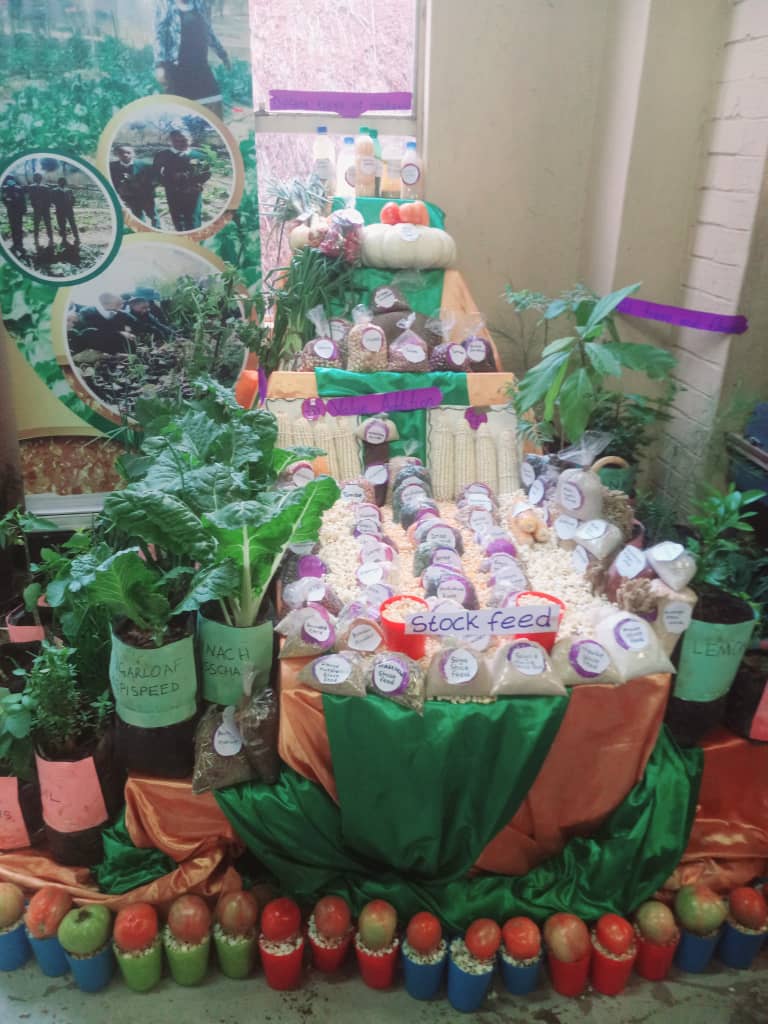|
Getting your Trinity Audio player ready…
|
Writes Chimeno Azriel
The introduction of Environmental Clubs is benefitting educational institutions like Kadoma-based Sir John Kennedy Primary which joined the Head of State and Government, His Excellency Emmerson Dambudzo Mnangagwa during the 2023 edition of the Harare Agricultural Show where it scooped the best stand award for the schools category.
The impacts of climate change have strained children’s educational programmes, mostly in Zimbabwe, due to low coping mechanisms and being under-resourced. Schools around the country are at the epicentre of extreme weather events, such as flash floods, cyclones, hail, and strong winds which destroy school buildings, learning materials, roads, and bridges. These make it extremely difficult for school children to stay in school and continue to learn.
For these reasons, Zimbabwean schools have made climate education part of the schools’ curriculum. Besides indoor learning activities, Sir John Kennedy Primary School has also introduced climate protection activities in the form of an Environmental Club. This club is aimed at cultivating environmental participatory behaviour, and eco-living that endeavours to instill environmental consciousness from a tender age.
Formed in 2022, the school has over the years been turning around its environment with various projects. During a tour, it emerged the school has managed to have an orchard, nurseries, reafforestation, and botanic garden. The school has managed to attend workshops organised by the Environmental Management Agency (EMA), and Forestry Commission.
The school exhibited at this year’s Harare Agricultural Show where they scooped first prize under the schools’ category and they managed to exhibit again at the Kadoma Agricultural Show and won the best stand (school category).
Schools play an important role in the environmental discourse of climate change mitigation and adaptation for future developments. This is done, not in isolation but within the framework of sustainable development goals, particularly goals number 4 and 13. The Club, with the help of coordinating teachers, has realized that quality education cannot only be achieved in the classroom hence the need to merge theory with practice as they participate and showcase in a variety of exhibitions.
Sir John Kennedy Environmental Club is participating and actively involved in communicating their own initiatives and raising awareness of environmental issues as part of their lifelong learning, skills-based practices, and networks. This has helped the school improve its knowledge, information base, and local conditions.
During an interview, the Coordinator of the Club, Mr. Bvumai Precious Gumbo said the aim of the club is to have children’s participatory cultures and behaviours to promote environmental consciousness, green living, appreciation of surroundings, sustainable knowledge attainment, and environmental stewardship.
“We are aimed at conditioning these pupils to participate in child-friendly adaptation programmes through composing, documenting, and presenting poems on environmental conservation and climate literacy, exhibiting at Agricultural Shows and other gatherings, and recording themselves and sharing them with the world via different social media platforms,” said Mr. Gumbo.
The school has been engaging in a variety of resilient building tasks like environmental debates, where they lock horns with other primary schools in Sanyati District and are competing for various prizes. This has situated the children at the heart of sustainable development, realizing that they are communicators of risk and drivers of change around the school and their communities.
With 60 members, the school has so far participated in environmental poetry, debates, and school-related environmental projects, like tree planting, nutritional gardens, and composting, among others.
This has paved the way to express themselves to the world since they are often marginalized from the official decision-making processes with regard to environmental conservation and management.
The school has a boarding facility and the club is growing vegetables and crops like maize. They supply green mealies and maize meal to the boarders. The School environmental club proved its mettle. For quite a long time, environmental issues have been articulated from the adult perspective, leaving children to be mere passive participants and onlookers.
The club has been showcasing a variety of traditional foods such as mufushwa, dovi, mapfunde, nyimo, nyemba to name only but a few.
The school head, Mr George Chipare said the school is in support of the Club.
“The school has seen the work that the Club has done over the past year and we will continue to support it. The club provides quality education, knowledge, and tools they need to mitigate and adapt to the impacts of climate change,” said Mr Chipare.
The School’s Environmental Club is under the guidance of Mr. Precious Gumbo , Mr. Garikai Shingai, Mr Blessing Chapanduka, and Mrs. Vongai Madzitire.
It is set for greater heights and the school Club Committee said they have learned a lot on protecting the environment. The Chairperson of the Environmental Club, Tembo Emilder who is in Grade 6 said that the club, has benefited a lot and they are in a position to protect the environment.
“We have benefited a lot from the club and we have established our orchard, nutritional garden which is good for our health and we are now providing the boarders with vegetables, onions, tomatoes, and cabbages while protecting our environment,” said Emilda.
Other members who spoke to this publication include Kamambo Tinevimbo, Lefijasi Nokuthula, Obert Timothy, Chiundura Keith, and Muzanengamo Kudzai who exhibited at the Harare and Kadoma Agricultural Show.
